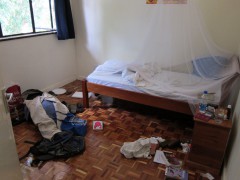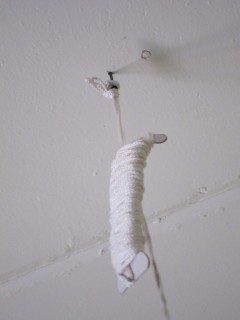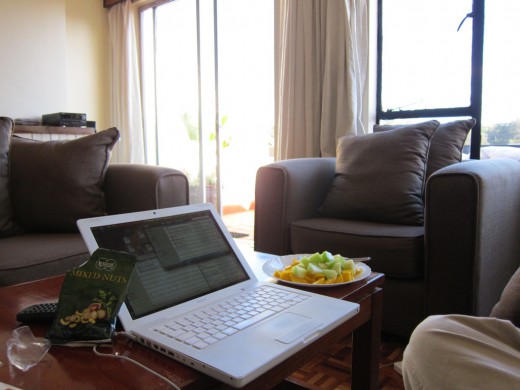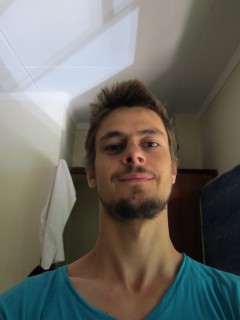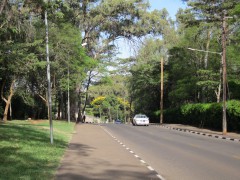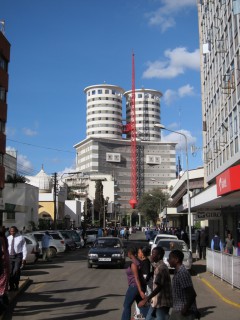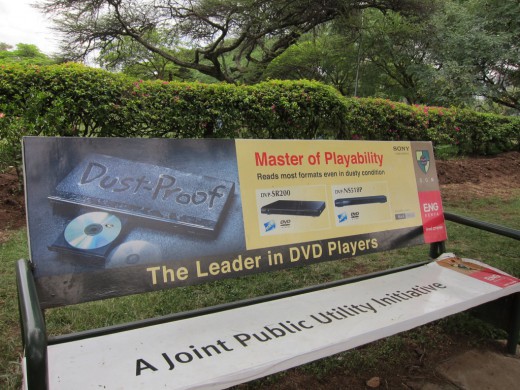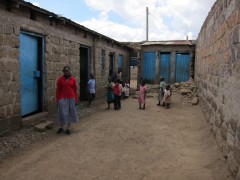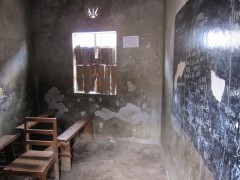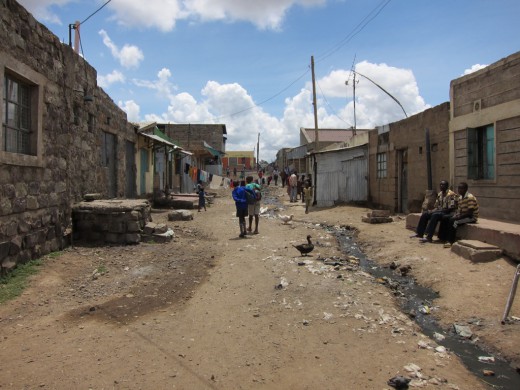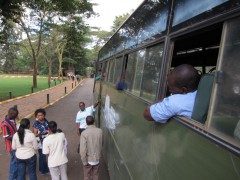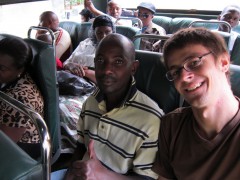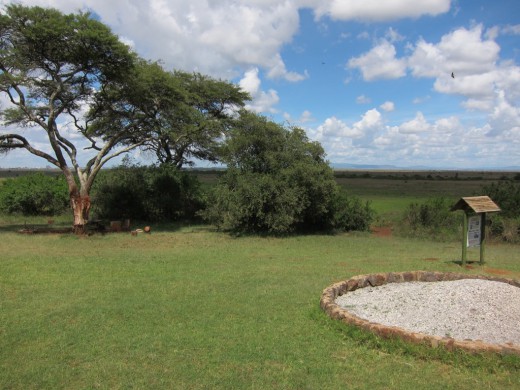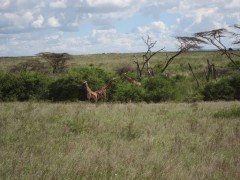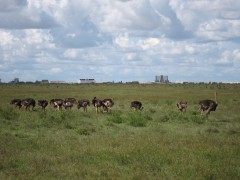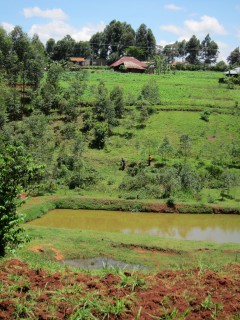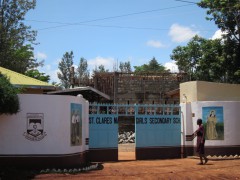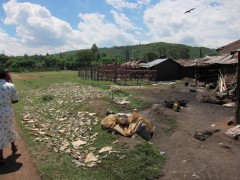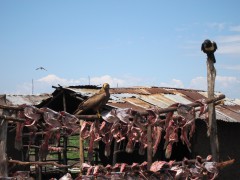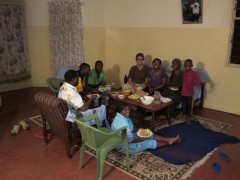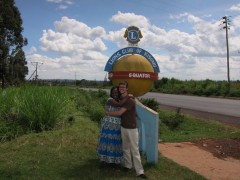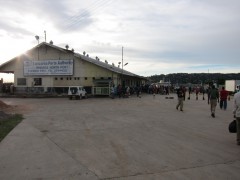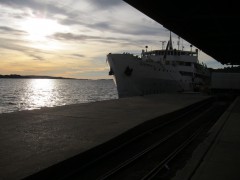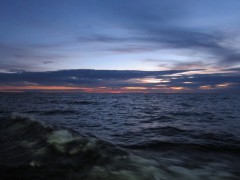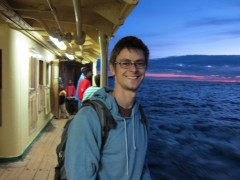Kenya 1 — Just passing through
In catching up with blogging (I was both very busy and very offline for the last weeks) I continue in English with mostly some commented pictures. Please bear with me, the next more content-intensive post is coming up (even though it will be again in German I’m afraid). My 10 days or so in Kenya were very good, even though I arrived with a cold that kept me in the house for some days, and caught my second diarrhea in this year just a few days after recovering from the cold.
First, the immigration procedure was very painless and reasonably fast. After walking out into the early morning and probably looking a little disoriented, a nice lady approached me, who was working at a desk organizing taxis, and is also somehow associated with a safari company. She offered to get me a cab for the price that my friend at who’s place I was going to stay had told me was good, so I accepted. She was also so nice to show me the ATM in the airport and accompany me to buying a local „safaricom“ SIM-card for my mobile. The first taxi driver actually refused to drive me for the price that the lady suggested, so she had a little discussion with the group of guys until someone accepted, and I was very happy that I didn’t have to do that myself.
The cab driver also turned out to be a very nice guy, and I had plenty of time to verify that, because we spent some two hours together in an almost motionless traffic jam. His first reply to my question how life was in Nairobi was „expensive“. Indeed, the newspapers of the coming days would confirm that due to rising oil/gas and basic food (maize/corn) prices, Kenya was on the verge of political unrest, and the government removing all taxes from these products only soothed the public slightly. Also in the cab I already hat my first little lesson in what moves people here: The radio host had a program on „why do some men love their children but still hate the woman who gave birth to them, and stay together for the kids?“. He was quite polemic on that, but had a bunch of serious and honest callers, giving all the different party’s perspectives. There seem to be a bunch of marriages that deteriorate from small daily hassles, and others that remain scarred after sexual infidelity, mostly of the husband. Again, talking to some locals afterwards also gave the impression that men are as „open“ on the issue here (at least as far as they are concerned) as women are adamant and unforgiving. Bad combination.
Anyway, as I said I was half sick and very happy to reach the flat and find a nice guest room and generally clean and spacious house waiting for me. I could throw all my stuff around on a nice wooden floor, and after some improvisation with the mosquito net I brought (and which has already served me well so many times, thank you Johannes!) I could sleep in peace.
A big living-room with comfy couch and (oh wonder!) a stereo that I could connect to the music in my computer made the sick days as agreeable as they can possible be.
And after venturing out for the first time I decided to get rid of my India-beard, pretty much an institution for European travelers there. While people here dress so nicely that I am embarrassed enough to be walking around in my lowly traveler’s wardrobe, without also looking poorly groomed. Here are hairy and baby face.
Nairobi struck me as very spacious, with very little crowding even in the downtown („uptown“ to locals) area, at least compared to Bombay, and very modern.
So apart from skin color the only hints of not being in the US are odd things like this advertisement centering on the dust-proof quality of the device.
Of course, things look much differently in the parts of the city that the locals call downtown, and where basically everything happens that can’t be in the nice city center with it’s bank skyscrapers. Food is much cheaper there (and actually fresher), and the nightlife more interesting. But then, even a local doesn’t want to linger too much between the safety of the bar and the car.
And that’s still a whole league away from the slums, which I got to visit as part of the assessment of a potential project for Action 5. These is a look at the yard of a school with some 300 students, and a classroom where more than 30 of them are supposed to learn.
But actually, living conditions there have improved a lot, and an increasing number of people can afford building solid houses. Also electricity connection is in progress, but clean water and sewage are still out of reach. This is a view of the surrounding of the school, Soweto, Kayole, Nairobi.
After that, an afternoon safari in the nearby Nairobi National Park was a welcome change. The price for foreigners is exorbitant, like seemingly in all Kenyan national parks, it was $50 for the 4 hour bus tour. And my local friend and travel guide had to pay only a fraction of that.
A first impressive sight is the heap of ashes where I think a president of Kenya’s history had ivory worth millions of dollars burnt in a symbolic act — it had been seized from illegal hunters.
I especially liked a close view of beautiful giraffes, and that indeed as the guide promises you get a lot of the wildlife with Nairobi’s skyline in the background.
The next step was visiting another project in Kisumu, working with orphans in another slum and impoverished rural areas. The scenery of the latter is amazingly beautiful and lush, and wouldn’t make you guess that people here are struggling for food. Of course, it all depends on the size of your land, and your strength and health to be able to work it. Also, even if you’re very poor you’re not safe from theft, for instance almost-ripe fruits and crops… Another thing that looks very nice are the many flourishing catholic schools. I hope they have a somewhat secular curriculum.
A giveaway of the economic situation is the occupation of one of the families we visit — drying and partly frying the leftovers from fish factories, like the fish skin, and selling it on the market. And they even have to buy the leftovers. And defend them against the marvelous birds.
Staying with the family of a key member of this active group was very very nice. It’s good to have a big family around always, and delicious food from mama! And, oh, I got to stand on the equator!
The travel from Kisumu to Mwanza in Tanzania was a bit of a hassle, the buses don’t actually cross the border, so that from the nearest bigger town I had to take a matatu, sort of taxi-minibus. In that case it was a simple car, packed with ten people and my big backpack (4 in the front, 4 in the back, 2 in the trunk). Then I had to walk over the border, for which I had nice help from two guys with bicycles. Also the border officers were very helpful, and I got only slightly ripped off by the black-market money changer. In Kisumu, no bank or bureau de change had had any Tanzanian Shillings, and there was none at the border — even the officials referred me to the unofficial solution. Not so nice was that the bicycle guys seriously thought they could trick or threaten me into paying 10 times the agreed-on price, which was a little too much already. Luckily, the bus driver helped — but then kept my change for the fare in the confusion. Oh well, the bike guys got about 1 Euro, and the bus fare was 5 instead of 3.5 Euros with the „forgotten“ change…
The ferry trip from Mwanza to Bukoba definitely made up for it. Already in Mwanza I got a decent taxi fare without haggling and a nice meal of fries and egg at the port for 50 Eurocents (I actually cheated the poor guy out of 10 cents because I didn’t grasp the numbers and currency fully yet, and still feel guilty about it!). The idea of reading a little in the park while waiting resulted in me making friends with a bunch of ragged young man, sharing some of my travel provisions with them and, no, sorry, not paying the ferry ride for one of them to visit some sick relative. I did make some real friends on the ferry, though, among them a young man from Uganda who studied environmental protection (or something like that) and is applying for positions as environmental officer with oil-drilling and gold-mining companies, who are legally required to employ somebody on that post. I wish him the best of luck for implementing anything in such an environment!
Here is the ferry and port building in Mwanza, and beautiful sunrise in the lake and sleepy me close to Bukoba.
So, this is my first farewell from Kenya, country of almost impeccable English (in anybody with secondary education at least, not so in the slums and rural areas I visited of course). And on to Tanzania, where Kiswahili is beautiful, but even secondary school teachers lag far behind the Kenyan standard of English. I’ll be learning, nitajifunza kiswahili.
